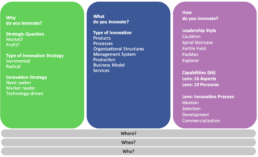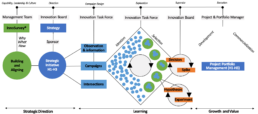
Innovation Methodology by Innovation 360
Firstly the Innovation methodology has been built on many years of data analysis, experimental results, and academic research. It began with the understanding that two seemingly identical companies employing the same strategy in the same market can see wildly different results. The variation can mean the success or failure of the business. So, you must get the strategy right the first time.
Secondly, the research determined that the best way to minimize risk and keep a business viable as conditions fluctuate is to develop a customized strategy based on a 360-degree assessment of the company’s internal and external capabilities. From there, you can begin to innovate in a structured way, with repeatable processes and hard metrics.
Here’s a quick overview of the science behind our methods, our processes, and our approach.
The Science of Innovation Methodology - The Fundamentals

The 3 Innovation Horizons
All innovation projects can be divided into three parallel horizons. The first Horizon 1 (H1) is about incremental innovation for today’s business. In Horizon 2 (H2), you expand and build new business. Horizon 3 (H3) is an explorative approach to future innovation. This model is based on research by Steven Coley.
The Innovation Framework
This part of the innovation methodology details how to align an organization's strategy with their leadership style, culture, capabilities and competencies. This is the key to building a sustainable business as markets change. The framework, made up of 5 W’s and 1 H, is based on research by Magnus Penker.


The Wheel of Innovation Sectional Analysis
The results of the Innosurvey indicate the strengths and weaknesses of each organization. The semi-circles and quadrants correspond to different aspects of innovation and suggest skill gaps that need to be filled. The data, supported by our AI and advanced analytics, pinpoints the optimal strategy for each organization to achieve higher gains at a lower risk.
Open Innovation and the Innovation Methodology
Governance
A single innovation isn't sufficient for long-term success. A culture of innovation produces a pipeline of idea for continuous improvement. Innovation360 helps organizations design and implement their own Innovation Board, Task Force, Internal Sponsors and Project Leads.
Ideation Platform
Ideas appear on their own schedule. Your ideation platform should be mobile enough to capture ideas as they happen on employee phones, and powerful enough to enable collaboration for stronger engagement. Built-in AI assists with the clustering and selection of the best ideas.
Prototyping
Too many great ideas never make it off the drawing board. Leading innovators depend on a robust system for generating working hypotheses, testing concepts, and prototyping innovations to minimize risk before incurring all the costs of commercialization and taking the innovation to market.

The Innovation360 Approach
Assessment
Firstly., we begin with a complete 360 degree assessment of the organization’s strengths and weaknesses, internally and externally.
Design
Thirdly, we set the goal and direction. we help design the best ideation process, idea management, innovation governance model, and a repeatable process for innovating across all three innovation horizons.
Analysis
Secondly, we run the data from the assessment through AI-supported analytics, correlating results with the company’s defined goals and culture to isolate the most productive path for innovation.
Implementation
Fourthly the most intricate step in the process of innovation is the final realization and commercialization process. This is where we bring innovations to market with the best chance of success.
Average company lifespan has shrunk to 10 years – Don’t be average!
Everything is an S-Curve. Even you and even your company. It means you’re born, you grow, then you fade.
Four Flashing Warning Signs You Can’t Ignore
There are four flashing warning lights that indicate faster, more flexible competitors are about to reshape the competitive landscape
The Key to Your Future Is Hiding in Your Company DNA
It’s common to define brands by their traits.
A Structured Cultural Approach Managing Uncertainty
Culture is like a operating system that runs in the background and defines what is possible. When it works, we don’t usually think about it...
Innovation by numbers: Lessons to learn from the CIA and Netflix
Back in 2011, we were wondering how to develop the first hypothesis in the large and very complex assignments...
A Strong Culture Is Its Own Incentive for Innovation
Over the years I have seen many attempts at incentive programs for innovation. It’s no secret that...
How to Avoid Innovation Blockers and Activate Amplifiers
There is a sweet spot in the market where your organization can outperform...
Innovation Is Not Mad Science, It’s Good Science
One of the most common misconceptions about innovators is that they, like artists...
How to sell and deliver like the world’s top firms like McK, BCG, and Accenture
Sell and deliver Innovation Consulting Services like the world’s top firms like McK, BCG, and Accenture
Business Key Drivers Anticipate Future Ones with PESTLED – PESTEL
Are you confident in your strategic thinking?
Business Experiments in Practice
Innovation in business isn't just about coming up with new ideas; it's about testing them. Welcome to our comprehensive guide on business experiments!
60 Minutes of Innovation Management
While innovation requires methodology to succeed, it is not a formula. One cannot copy successes from one context to another. One can only design a strategy after carefully examining what makes an organization unique. This requires conducting both qualitative and quantitative analyses to uncover the right insights. When an innovation project begins, things move fast, so having the correct framework to make decisions becomes key.
This 60-minute introduction to Magus Penker’s Innovation Management will guide you through the proven methodology. The methodology is used by global companies, scale-ups and unicorns all over the world. Pushing the boundaries of the possible.
If you’d like English subtitles for these videos, select Watch on YouTube and turn on “CC.”